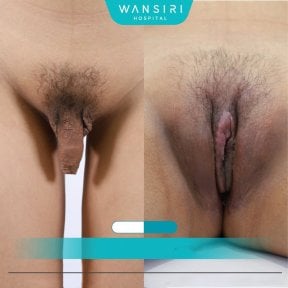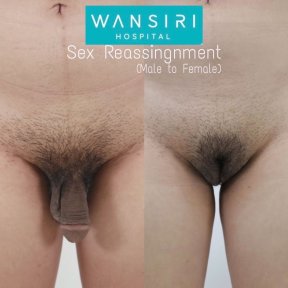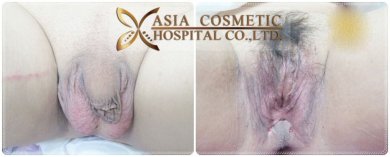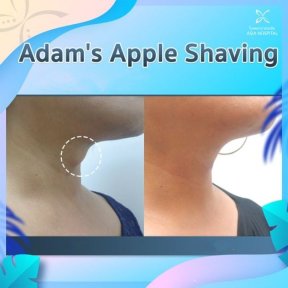Why choose Thailand for transgender surgery?
1. Leading medical tourism destination. Thailand's medical tourism market was valued at $2.57 billion in 2023 and is projected to grow over 10% through 2030. The country welcomed approximately 580,000 medical tourists in 2025, with average spending of 107,662 baht ($3,000) per trip. Thailand is justly considered the sex change capital of the world.
2. Doctors' expertise. Thailand's surgeons are among the world's most skilled in sex reassignment surgery, with leading specialists including Dr. Saran Wannachamras (30+ years experience, Wansiri Hospital), Dr. Jiraroch Meevassana (Wansiri Hospital), and Dr. Tanongsak Panyawirunroj (25+ years experience, Asia Cosmetic Hospital). For almost 50 years, Thailand has been driving the progress of SRS. In 1975, Dr. Preecha Tiewtranon performed the country's first transgender surgery. His work set the foundation for Thailand's expertise in this field.
A patient from Austria reported: "It is an excellent team with high competence and efficient problem solving, I had an excellent feeling and the trust in the doctors was always confirmed, I was completely cared for and I am grateful for this opportunity." (Bookimed verified review, 5.0/5 rating)
3. World-class accredited facilities. Thailand leads Southeast Asia with 65 Joint Commission International (JCI) accredited medical facilities as of November 2025, ranking 4th globally after Saudi Arabia, China, and the UAE. Top-rated facilities verified through Bookimed include Wansiri Hospital (5.0/5, Bangkok), Asia Cosmetic Hospital (4.2/5, Bangkok), and ID Clinic Bangkok (4.5/5, Bangkok). Chulalongkorn University is at the forefront of medical research and training in transgender care.
A patient from the United Kingdom who received treatment at Wansiri Hospital shared: "The hospital is great. I have been looked after since the moment I arrived. The medical outcome is superb. The nurses were very kind and attentive. I wholeheartedly recommend Wansiri Hospital." (Bookimed verified review, 5.0/5 rating)
4. Innovative surgical techniques. Striving for superior surgical outcomes, Thai doctors have developed some of the latest techniques in sex reassignment, such as non-penile inversion vaginoplasty and peritoneal vaginoplasty.
5. Affordable cost. Medical costs in Thailand are 30–70% lower than Western countries while maintaining international standards. This makes Thailand attractive for transgender people without insurance or those looking for more affordable options.
6. Hospitable and serene environment. Thailand is known for its warm hospitality, which extends to its medical community. Moreover, the opportunity to combine gender confirmation surgery with tourism promises a more enjoyable recovery process. Recovery after a Thai sex change operation takes place in peaceful settings. Patients can rest by quiet beaches or in private recovery centers surrounded by nature. These calm environments help with physical healing and emotional well-being.
A patient from Germany shared their experience: "The best thing that could have happened to me. I had a sex change. It was all quick and uncomplicated. In Germany I would have had to wait over 3 years, maybe even longer. I was pampered and all my wishes were fulfilled. Arrival, transfer, hotel, clinic..... Everything was perfect." (Bookimed verified review, 5.0/5 rating)
7. Acceptance of trans people. Thailand has one of the world's most visible transgender communities. The country's open-minded Buddhist culture shows a high level of societal acceptance toward trans people. Research indicates 0.3–0.6% prevalence of transgender individuals in Thailand (approximately 210,000–420,000 people based on 70M population). In Bangkok, encountering kathoeys (transgender women) is a common experience. They are prominent in entertainment and media.
Thailand also hosts Miss International Queen, the world's largest transgender beauty pageant. This cultural aspect translates into compassionate care in Thailand's gender confirmation clinics.
What is the cost of gender reassignment surgery in Thailand?
![faq image]()
In Thailand, sex reassignment surgery usually starts from $9,500 according to verified pricing data. Male-to-female (MTF) procedures can range from $8,000 to $20,000, and female-to-male (FTM) surgeries cost between $12,000 and $22,000. This is 2–4 times lower compared to the costs in the United States, the United Kingdom, and Australia.
The table below provides a cost comparison of FTM and MTF surgery costs across several countries:
| Country |
MTF Surgery Cost |
FTM Surgery Cost |
| Thailand |
$8,000–$20,000 |
$12,000–$22,000 |
| United States |
$20,000–$50,000 |
$25,000–$134,000 |
| United Kingdom |
$15,000–$43,000 |
$50,000–$88,000 |
| Australia |
$20,000–$30,000 |
$50,000–$80,000 |
| New Zealand |
$54,000 |
$219,000 |
New Zealand presents a unique challenge, as the country has been unable to provide sex reassignment surgery domestically. A few publicly funded surgeries have been performed overseas, costing between $53,500 and $219,000 on average. However, at the current rate, it would take 50 years to clear the waitlist for these procedures.
Check out our handy guide to transgender surgery costs.
What is included in the Thai sex change operation package?
Thailand offers all-inclusive sex change surgery packages to ensure a comfortable and smooth experience for transgender patients. A Thai sex change operation package typically includes:
- Fees for the surgeon, anesthesiologist, and operating room usage.
- Post-surgery recovery room charges, including nursing care.
- All necessary medications during your hospital stay.
- Meals throughout the hospital stay.
- Airport-hotel-hospital transfers.
It's common for patients to undergo multiple procedures to maximize the effectiveness of the transition process. For instance, surgeons can combine orchiectomy, tracheal shave, and vaginoplasty as part of the male-to-female (MTF) sex reassignment surgery.
This approach helps patients save money by reducing separate hospital, anesthesia, and operating room fees. It also shortens the overall recovery time, as patients only need to heal once. As a result, the process is more efficient and less stressful.
What are the surgical outcomes and satisfaction rates?
Gender-affirming surgery demonstrates high long-term satisfaction rates based on peer-reviewed research. A 40-year follow-up study found patients achieved an 89.6% long-term overall body congruency score, with satisfaction persisting decades after surgery. Body congruency scores for chest, body hair, and voice ranged from 84.2% to 96.2%, while genital satisfaction scores ranged from 67.5% to 79%.
Regret rates remain extremely low. A comprehensive systematic review and meta-analysis of 7,928 patients across 27 studies found regret rates of only 1% after gender-affirming surgery. Of the 77 patients who experienced regret, 28 had minor regret and 34 had major regret based on established classification systems.
For top surgery specifically, a single-center study found 90.5% of patients were satisfied or partially satisfied with overall results, with 89.3% very satisfied with their clothed appearance. Only 2 patients out of 90 expressed regret about their decision.
A patient from the United States shared: "From the moment that I requested services to the time of recovery, everything has been perfect. I am two weeks out from surgery now, and just loving the look of everything so far." (Bookimed verified review, 5.0/5 rating)
Where can I get the best and cheapest SRS surgery in Thailand?
Based on analysis of 137 Thai clinics serving over 96,000 gender reassignment requests, these facilities offer the best balance of price and quality with verified patient ratings:
| Clinic |
Procedures |
Cost |
Included services |
Highlights |
Patient rating |
| Wansiri Hospital |
Top surgery, bottom surgery, facial feminization surgery |
Bottom surgery: $10,500–$22,000
Top surgery: $7,700 |
• Surgery
• 5-star hotel
• Anesthesia
• Pre-op tests
• Medications
• Follow-ups
• Dilators
• Gender dysphoria certificate
• Transfers
• Dinner cruise |
• High success rates in MTF surgeries, including penile inversion, colon, and peritoneal vaginoplasty.
• Led by Dr. Saran Wannachamras — 30 years' experience, US-trained.
• Luxury, high-tech facility with "Clean Room"-standard operating theaters. |
⭐️⭐️⭐️⭐️⭐️ |
| Yanhee International Hospital |
Bottom surgery, top surgery, facial surgery, voice surgery |
Colon vaginoplasty: $18,000
Voice feminization: $3,800
Tracheal shave: $1,200 |
• Surgery
• Hospital stay
• Consultations
• Medications
• Anesthesia
• Post-op care and follow-ups |
• Treats over 1.1 million patients annually with 72% of foreign patients receiving cosmetic care
• Certified by ISO and JCI
• One of Thailand's top 15 hospitals, according to Newsweek |
⭐️⭐️⭐️⭐️⭐️ |
| Asia Cosmetic Hospital |
Top surgery, bottom surgery, facial feminization surgery |
Bottom surgery: $6,900–$12,500
Top surgery: $4,500 |
• Physical exam and texts
• Anesthesia
• VIP nursing
• Medications
• Follow-ups
• English translators |
• ISO and JCI-accredited
• Dr. Akkrasash Vongjirad, 25+ years of experience |
⭐️⭐️⭐️⭐️ |
Where to get gender reassignment surgery in Thailand?
![faq image]()
In Thailand, the most popular locations for gender reassignment surgeries are Bangkok and Phuket.
|
Location
|
Pros
|
Cons
|
Clinics
|
|
Bangkok
|
• Country's most esteemed SRS surgeons with 30+ years of experience and innovative practices.
• One of the 10 most visited cities in the world and a leading medical tourism destination. Offers high-quality medical care alongside attractions like street food, markets, and temples.
• Bangkok clinics often provide holistic care, including mental health support and post-operative care.
|
• Bangkok's busy streets and fast-paced lifestyle might be overwhelming for some.
|
• Yanhee International Hospital
• Asia Cosmetic Hospital
• Wansiri Hospital
|
|
Phuket
|
• Accredited clinics with skilled surgeons adhering to international healthcare standards.
• Picturesque beaches, clear waters, and a tranquil setting ideal for recovery.
|
• Fewer specialized gender reassignment surgeons compared to Bangkok.
• Costs are approximately 10%–15% higher than in Bangkok due to Phuket's resort status and limited competition.
|
• Phuket Plastic Surgery Institute
|
How to find the best SRS surgeons in Thailand?
![faq image]()
Research medical background
Look for surgeons with a medical degree from reputable institutions and additional specialized training in plastic and reconstructive surgery. A strong academic background is a solid foundation. Graduates from Chulalongkorn University are especially skilled since this is the first and best Thai institution to teach sex reassignment surgery systematically.
Confirm board certification
Look for an SRS doctor certified by the Thai Board of Plastic Surgery. This certification indicates that the surgeon has met specific standards of education, knowledge, and expertise in plastic surgery.
Check membership in professional organizations
Membership in reputable professional organizations signals a commitment to excellence, ethical standards, and continued education. Keep an eye out for SRS surgeons who are active members in the following organizations:
Look for extensive experience in gender-affirming surgeries
Consider surgeons with extensive experience, specifically in gender-affirming surgeries. Those who specialize in SRS have more refined skills and a better understanding of the nuances involved in these complex procedures.
Review before-and-after photos
Ask to see before-and-after photos of previous gender confirmation procedures the surgeon has performed. This can give you an idea of their skill level and the results you might expect.
Read patient reviews
Look for feedback from former patients to gain insights into their experiences. Patient reviews can provide valuable information about the surgeon's bedside manner, the supportiveness of their staff, and overall patient satisfaction.
Consider hospital affiliations
The best surgeons are affiliated with reputable hospitals and clinics known for high standards of care. Research the facilities where the surgeon operates to ensure they have modern medical equipment and a supportive environment.
For convenience, check Bookimed's list of accredited partner clinics specializing in sex reassignment surgery.
Assess your comfort and trust
Choose a surgeon you feel comfortable with and trust to perform your SRS surgery. A surgeon must be communicative, empathic, and respectful of your gender identity. An in-person or virtual consultation will allow you to ask questions, discuss your goals and concerns, and gauge whether the surgeon fits your needs.
Inquire about follow-up care
Find out about the surgeon's follow-up care plan after the gender-affirming surgery. It's important to have access to post-operative support and monitoring to ensure a smooth recovery process and address any complications that may arise.
What types of gender reassignment surgery do gender surgeons offer in Thailand?
![faq image]()
Thailand's experienced surgeons offer an extensive range of surgeries to meet the diverse needs of transgender patients. Although Thailand is especially famous for its male-to-female transformations, the country's surgeons cater to the needs of transgender men and nonbinary people as well.
- For male-to-female (MTF) transitions, a surgeon performs breast augmentation to create a more traditionally feminine chest.
- For female-to-male (FTM) transitions, Thai surgeons perform mastectomy, or the removal of breast tissue, to achieve a more masculine chest appearance.
Learn more about top surgery.
Male-to-female (MTF) surgeries:
- Vaginoplasty — Thai surgeons primarily use penile inversion vaginoplasty with glans-derived sensate clitoroplasty. For patients with insufficient penile tissue, intestinal vaginoplasty using colon or ileum segments provides alternative reconstruction. Recovery typically requires 3–6 months with dilation protocols to maintain vaginal depth and width.
- Vulvoplasty (or zero-depth vaginoplasty) — creation of a vulva (external genitalia) without a vaginal canal.
- Orchiectomy — removal of the testicles.
Female-to-male (FTM) surgeries:
- Phalloplasty — Phalloplasty remains one of the most complex gender-affirming procedures, with radial forearm free flap being the most common technique. Despite complexity, functional outcomes are generally positive: over 93% of patients retain tactile sensation and over 92% can void while standing. Single-stage urethroplasty shows lower complication rates compared to multi-stage procedures.
- Metoidioplasty — creating a penis from clitoral tissue.
- Hysterectomy — removal of the uterus.
- Oophorectomy — removal of the ovaries.
Cosmetic Surgery/Maxillofacial Surgery
Gender reassignment surgery in Thailand often involves modifying facial features to make them more feminine or masculine. Facial feminization surgery (FFS) is especially popular. SRS surgeons can reshape the jaw, chin, forehead, and nose, as well as perform a tracheal shave to make the Adam's apple less prominent.
Read up on what to expect from facial feminization and masculinization surgeries.
Voice Surgery
Voice feminization/masculinization surgery tailors the pitch and resonance of the voice to be more congruent with the patient's gender. This surgery can be particularly impactful, often supplemented by voice therapy for lasting results.
What are the potential complications and risks?
While gender-affirming surgery demonstrates high success rates, patients should be aware of potential complications. Over 97% of procedures proceed without major complications when performed at accredited facilities by experienced surgeons.
- For vaginoplasty procedures, a 13-year review of 332 male-to-female patients found that most patients experience successful outcomes, with complications typically being manageable when they occur. The most common issues include narrowing of the urethral opening and stricture formation, which are treatable with minor procedures.
- For phalloplasty procedures, while this remains one of the most complex gender-affirming surgeries, functional outcomes are generally positive. Over 93% of patients retain tactile sensation and over 92% can void while standing. Urethral complications, while more common in complex reconstructive procedures, are often correctable through additional procedures.
- Top surgery complications are significantly lower, with complication rates requiring intervention occurring in fewer than 10% of cases, with most being minor and easily correctable.
Important: Individual risk factors, surgeon experience, and post-operative care significantly influence outcomes. Choosing JCI-accredited facilities and board-certified surgeons minimizes risks. Always discuss specific risks with your surgeon during consultation.
What steps does SRS surgery in Thailand involve?
- Initial consultation. Often begins with an online consultation, followed by an in-person meeting with a doctor once you arrive in Thailand. This is where you'll discuss your goals, expectations, and any medical considerations with your surgeon.
- Pre-surgical assessments. Before surgery, doctors conduct comprehensive medical evaluations to confirm your suitability for surgery.
- Surgery. The length of the procedure varies depending on the type of gender confirmation surgery. For instance, an orchiectomy might take 1–2 hours, while more complex surgeries like vaginoplasty could last 3–6 hours.
- Hospital stay. After the operation, your surgeons will closely monitor your condition in the hospital for 3–7 days.
- Recovery in Thailand. After discharge, you'll need to remain in Thailand for post-operative care and initial recovery. Clinics often recommend staying close by for 2–3 weeks.
- Complete recovery. Full recovery can take several months to a year, with the most significant recovery milestones occurring in the first 6 weeks post-surgery.
- Long-term care. For comprehensive surgeries like vaginoplasty and phalloplasty, ongoing care may include hormonal treatments, additional cosmetic procedures, or revision surgeries, if necessary.
What are the requirements for gender reassignment surgery in Thailand?
Thailand's leading gender reassignment surgery clinics adhere to the World Professional Association for Transgender Health (WPATH) Standards of Care Version 8, published in September 2022. These evidence-based guidelines represent the international gold standard for transgender healthcare.
Current WPATH SOC-8 requirements:
- Persistent, well-documented gender dysphoria - Confirmed by qualified mental health professional.
- Informed consent - Comprehensive understanding of procedures, risks, and outcomes.
- Age requirements - Generally 18+ for genital surgery (SOC-8 removed specific age minimums, emphasizing individual assessment).
- Mental health assessment - One referral letter for chest surgery, two for genital surgery.
- Hormone therapy - 12 continuous months for certain procedures (unless contraindicated).
Specific clinics' requirements can differ, but Thai SRS surgeons usually require the following:
- A letter from a psychologist confirming you're mentally prepared for the surgical gender transition. This is needed to ensure that the procedure will alleviate your gender dysphoria and improve overall well-being.
- While not a strict requirement, a reference letter from someone who knows you well (like a friend, family member, or employer) can be helpful.
- Proof that you have been undergoing hormone replacement therapy (HRT) for at least 1 year.
- Lab tests to assess fitness for surgery:
- chest X-ray;
- electrocardiogram EKG;
- blood tests.
Thailand-specific considerations:
- 65 Joint Commission International (JCI) accredited facilities as of November 2025.
- Medical tourism visa allows 90-day stays for treatment and recovery.
- Gender-affirming surgery not covered by Thai public or private insurance systems.
How old do you have to be to get gender reassignment surgery in Thailand?
In Thailand, transgender surgery usually requires the patient to be at least 18 years old. This is the legal age for giving consent to medical procedures. However, some clinics might consider younger patients with parental consent and a comprehensive psychological evaluation.
How to get the best gender reassignment surgery in Thailand with Bookimed?
- Submit a request. Fill out a request on the Bookimed website detailing your gender surgery needs and preferences.
- Consult with a medical coordinator. Your Bookimed manager will promptly get in touch to discuss your needs, questions, and options to ensure you make a well-informed choice.
- Pick a clinic. With help from your Bookimed manager, pick the best clinic in Thailand for gender reassignment surgery. We'll ensure it fits your needs and wants.
- Get a free quote. After selecting a clinic, you'll receive a personalized cost estimate for your surgery.
- Plan your journey. Bookimed will help organize your trip to the chosen clinic, guaranteeing a seamless and worry-free process.
Resources
- The Guardian. (2023). 'They just go to Thailand': the long and costly wait for gender-affirming surgery in Australia.
- Healthdirect Australia. (2024). Gender affirming surgery.
- The Journal of Law, Medicine & Ethics. (2022). Utilization and Costs of Gender-Affirming Care in a Commercially Insured Transgender Population.
- Annals of Plastic Surgery. 2022). Long-term Outcomes After Gender-Affirming Surgery: 40-Year Follow-up Study.
- Plastic and Reconstructive Surgery Global Open. (2021). Regret after Gender-affirmation Surgery: A Systematic Review and Meta-analysis of Prevalence.
- Transgender Health. (2023). High Self-Reported Satisfaction After Top Surgery in Gender-Affirming Surgery: A Single-Center Study.


























